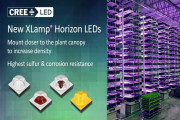Lighting Science Group Corporation®, one of the world's leading LED lighting technology manufacturers announced today it has been contracted by The Bionetics Corporation, a leader in space technology, to assist in the development of an LED lighting solution for the International Space Station (ISS).
The Boeing Company, the primary contractor to NASA for the ISS, initiated the project with The Bionetics Corporation in order to develop a lighting system that will assist flight crews with circadian alignment while in residence on the International Space Station.
With the absence of a 24-hour cycle based on the sun, astronauts currently based on the ISS need a lighting solution to queue their body's natural order. The Bionetics Corporation turned to the innovators at Lighting Science to assist in the design of the progressive LED lighting system that could achieve these results.
Lighting Science'® research and innovation team is assisting in the development of a lighting system that will be used by astronauts to adjust their circadian rhythms and sync them to a 24-hour a day cycle. The team is working within NASA's project specifications which require the lighting system to be of certain color temperatures (CCT) and color appearances (CRI) at different intervals during the day. With an average life span of up to 50,000 hours, LED lighting is the optimal lighting source for this application. In addition, LEDs are easily controlled, providing smooth dimming and a constant color temperature throughout day and night.
"Because of their knowledge and experience in the lighting industry and their industry lead in the use of LED technology, we selected Lighting Science to provide technical guidance, feedback and testing resources for the development of the lighting system," said Bill Wells of The Bionetics Corporation.
"This is a once-in-a-lifetime opportunity to push LED technology forward," says Rob Soler , Director of Electrical Research at Lighting Science. "And in doing so, we are able to utilize these advances created for space exploration and turn them into earth-bound LED lighting applications."





 CN
TW
EN
CN
TW
EN





